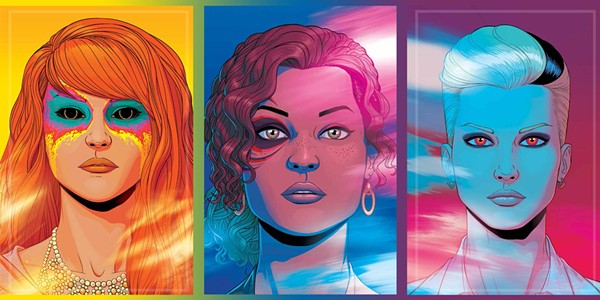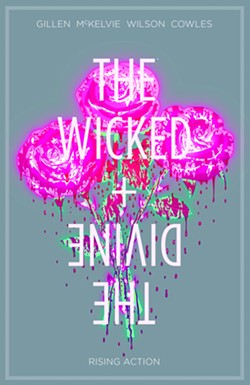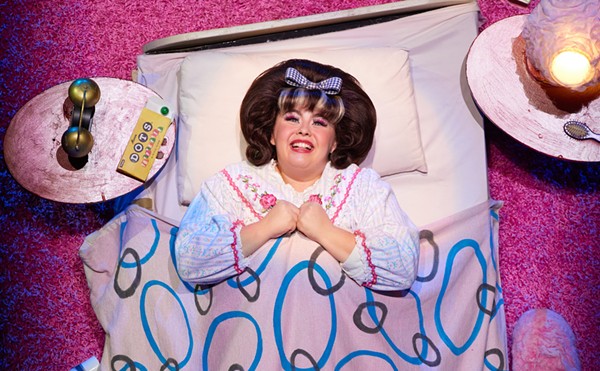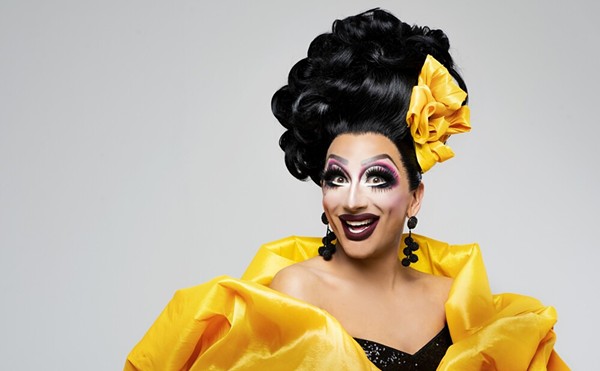
Sex, revelry, chaos, indulgence: perfect stocking-stuffers for the millennial in your life. Or, rather, stuffed perfectly into the perfect stocking stuffer: the serial comic The Wicked + The Divine (WICDIV), a fantasy spun by Kieron Gillen, author of such hits as Three, Phonogram and several issues of The Uncanny X-Men. Now in its third year, WICDIV follows the misadventures of Laura Wilson, an average 17-year-old girl living in South London, and the Pantheon, a collection of 12 supernatural celebrities claiming to be reincarnated deities from different religions across the globe. Every 90 years, these gods magically reappear, live their extravagant lives for two years — and then suddenly and mysteriously die. As the comic opens, this particular generation of divinities surfaces in the early 2010s, a time of social revolution for the modern young adult. These reincarnated gods fall all too easily into the groove of our contemporary counterculture, becoming instantaneous rock stars and using their powers to provoke the youthful masses into millennial rebellion. These gods’ rejection of traditional political authority is not an invention of the 21st-century club scene; rather, it is a remix of conventional, even classical, tropes. And one of these gods has been at this game far longer than any of the others: Dionysus.
Dionysus is, of course, the Greek god of alcohol, madness and ecstasy — qualities which fit neatly into London’s intoxicating nightlife. In Euripides’ Bacchae, Dionysus is described as a beautiful young man from the exotic East with fair skin, curly hair and a bit of a nasty streak: He tricks the women of Thebes into shredding and eating their king, an activity of dubious civic worth. In WICDIV, however, we are given a very different representation of this god of chaos. Gillen’s contemporary Dionysus is a bald, dark-skinned man of Desi origin with queer overtones, and arguably the most honest member of the Pantheon. This Dionysus possesses the ability to create a drug-like euphoria in whomever he touches, and instead of punishing humanity over a matter of pride, he conducts never-ending dance parties called “Underground Dionysus Kiss Stories.” Young adults swarm to these parties from all over to dance away their earthly troubles.
The differences between these two representations of the same god are striking, and bring us nearer to what Gillen is trying to say about his millennial readers and, by extension, all of us. Euripides’ Dionysus is vengeful, prideful, unforgiving — both the life and death of the party. But Gillen’s Dionysus is much different. He is honest, considerate, pacifistic and willing to undo his spell when partiers demand it, unlike the Dionysus of old. (However, they rarely ask for this.) Once a partier is touched by Dionysus, both are locked into a euphoric hive-mind, a sort of millennial Borg. Dionysus is forced to prioritize the needs of the dance floor, and never gets a moment alone with his own thoughts, not even in sleep. Gillen’s god of madness thus sees through his own artifice and is forced to be the emcee at a party he can never escape. However, being the considerate host that he is, he believes that the show must go on, even if it kills him (and given his two-year terminal prognosis, it will).
In WICDIV’s millennial version of Dionysus, Gillen has created a martyred people-pleaser who gives the masses a chance to escape from individual concerns and to enjoy the beauty of the collective self. The former ideology reflects how the older generation views the newer, while the latter ideology reflects how the newer views itself. For the modern comic book reader, this examination of youthful identity can provoke a startling, even painful moment of self-reflection. Yet Gillen also provides an optimistic spin on Dionysian hive-mind — perhaps this is rather a selflessness and a concern for ideas larger than ourselves? These gods are admired on an international level, not for who they are, but for what they can do for the masses. Their magic fills a hole that humanity didn’t know needed filling, and all it takes is a single taste of that magic to become hooked. The demand quickly grows to exceed what is humanly possible, even for a god, but the constant expectation to perform, and perform well, turns exponential. Yet the gods remain steadfast, pushing themselves to the brink of insanity just to appease their young fans. With the powers they possess, the gods could easily rule everything, but they choose to serve the world instead. It is bracing to see such questions of power and responsibility play out within the fabric of a “millennial” Greek tragedy.
The Wicked + The Divine is an ongoing series, and while Dionysus makes his first appearance in Issue 8, the rest of the narrative continues to examine the pressures of growing up Greek and/or millennial. With fantastically rendered illustrations by Jamie McKelvie, each page juxtaposes contemporary superhero designs with “classical” allusions and age-old subtexts. For more information about the comic, its creators, and where to purchase online, take a trip to wicdiv.com. Make sure to check out Issue 24, just out on December 7 (which gives you enough time to catch up on the first 23 issues before the holiday season ends). WICDIV makes an ideal gift for any comic-loving teen, even if Christmas is like, totally lame, mom.


















